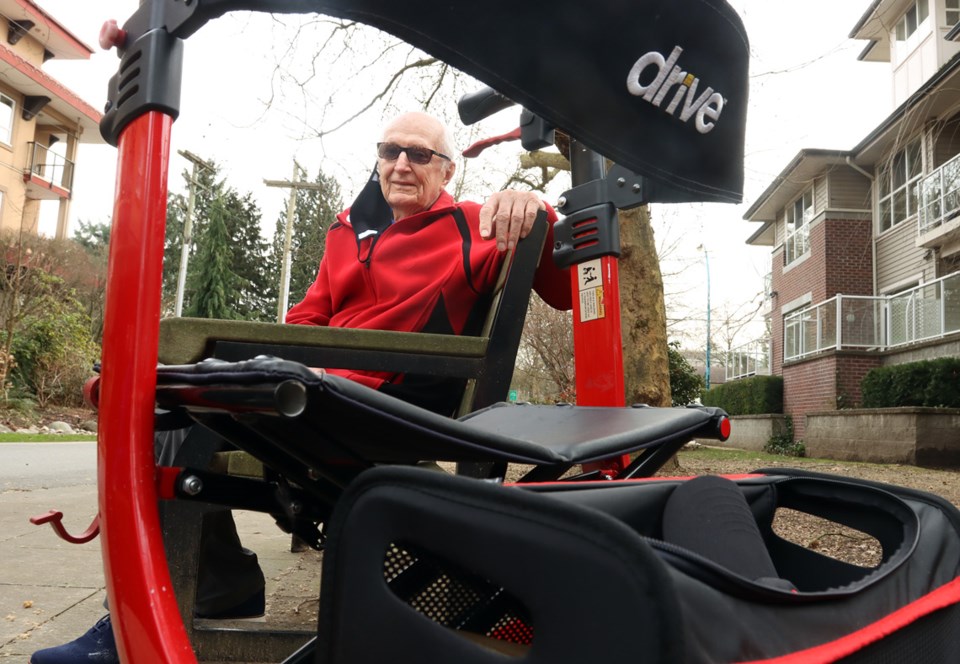Don’t worry, get vaccinated, that’s the advice of one 89-year-old Port Coquitlam man who got two doses of the Pfizer vaccine against COVID-19 and experienced minimal side effects from the shots.
As B.C. prepares to announce plans for vaccinating community-based seniors 80 years and older next week with mass vaccination at 172 sites across the province in April, retired journalist and communications consultant Jim Peacock who lives in a Port Coquitlam retirement residence says getting the shots is nothing to worry about.
“It gave me a greater sense of security,” said Peacock.
While he did experienced soreness in his arm for the first shot and a bit of dizziness and confusion for the second, there was little else in the way of reactions.
In fact, the shots administered by public health at the Astoria Retirement Residence in Port Coquitlam in January came as a relief.
PANDEMIC ONE OF THE WORST CALAMITIES
For the past several months since COVID-19 restrictions came into play, Peacock says life has been more challenging and less enjoyable because there is little entertainment and few distractions, like bus trips and musical events, and he can’t hug or kiss his grandchild or have family over for lunch.
Many seniors were also afraid of catching COVID-19, and their high risk is why they are at the front of the line for a vaccine in B.C.
“It’s had a huge impact on day-to-day living since the beginning of early March when things really started to clamp down,” said Peacock, who raised his family and lived for many years in Port Moody.
Peacock has faced challenges before and as a journalist has covered some of the world’s biggest cataclysms.
LIIVING THROUGH COVID-19 PANDEMIC TOUGH FOR SENIORS
He was a teenager growing up in Alberta during WW II and as a journalist covered the funeral of John F. Kennedy after the U.S. president was killed in 1963.
But living through COVID-19 with masks, physical distancing and other restrictions to keep the disease at bay has been among the hardest experiences he’s had to endure.
Even the war years, with rations and worry about the war in Europe and the Pacific, were manageable because you could still sit close to someone at the dinner table, shake hands and give your loved ones a hug — all off-limits since March 2020.
Writing a daily journal about his COVID-19 life, which he sends in dispatches to the Port Moody, Vancouver and Royal BC museums like he did when writing for the Canadian Press as journalist in the 1960s, Peacock is meticulous in keeping notes about his experience and recalls with clarity how life has been altered under threat of COVID-19.
Now, though, there is an extra bounce in his step as he looks toward brighter days when life returns to nearly normal once B.C. has achieved community immunity through a mass vaccination campaign.
Peacock, who is 89, and has received both doses of the Pfizer vaccine, said he is looking forward to the days when he can hug his three daughters and grandkids again. British Columbia is expected to start informing people over age 80 about their vaccinations for COVID-19 as the province prepares to open mass clinics while doing more in-depth testing for variants.
COVID-19 IMMUNIZATION WENT SMOOTHLY
But as part of B.C.’s first phase of vaccinations, the residents of his residence were given their first shot Jan. 10, with the second dose 42 days later.
The roll out went smoothly, he said, especially after those giving the vaccinations realized they could get six instead of five shots from a vial and were able to give first doses to staff and designated family members, including his daughter.
For their second shot, staff and designated family members had to go to clinics at Royal Columbian Hospital and in Coquitlam, Peacock said.
However, even with the vaccines, life has not returned to pre-pandemic norms: Masks must be worn at all times in public areas, except when dining, visitors are restricted and people who do come to the building have to go to a specific area or be outside. Everyone also stays two metres away from each other.
Peacock said he looks forward to the days when bus trips, entertainment and other activities that make life worth living and special are resumed.
As for adverse reactions to the shot, Peacock said one person received medical attention and a few were advised not to get the vaccine by their doctors because of their health conditions.
But he looked forward to getting the jab that would protect him from the coronavirus. “I had decided long since that as soon as there was an opportunity I’d get the vaccine, no hesitation whatsoever,” Peacock said.
However, he understands that many people might have questions.
Immunize BC has tried to answer people’s questions about the COVID-19 vaccine on a special web page and while the immunization campaign was slowed because of haults to vaccine delivery, plans are to ramp up quickly as more doses arrive.
B.C. plans are to hire dentists, midwives, pharmacy technicians, paramedics and retired nurses to assist at clinics administering vaccines at 172 vaccination sites as the province seeks to administer about 100,000 doses per day.
The rest of the province will be vaccinated from April through September with more details to be rolled out as a process is decided upon and and announced.
Though life hasn’t changed much for Peacock, who must visit with his family outside at a distance and while wearing masks, he still urges other seniors like them to get their shots when they are offered to them.
“Unless they’ve got some overriding medical condition that puts them at too high a risk, if their health is relatively normal, I’d say go for it.”


